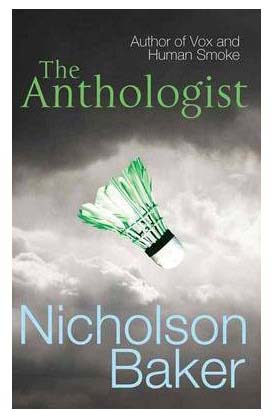

“Poetry makes nothing happen,” W. H. Auden wrote in his elegy for another celebrated poet, W. B. Yeats. In a way, Nicholson Baker’s latest novel, “The Anthologist”, proves how very right —and very wrong — that statement is.
Poetry makes nothing happen. Almost nothing happens to Paul Chowder, the solitary, morose, whimsical and altogether charming narrator of this slim story. Paul is a poet, but not a great one like Auden or Yeats, just a pretty decent one who’s had some success in The New Yorker and landed a commission to write the introduction to a new anthology of poetry called “Only Rhyme”. “Only Rhyme” is, as its name suggests, a collection of rhyming poetry — something Paul Chowder doesn’t write but likes to talk about. A lot. Unfortunately, he hasn’t been able to muster up the energy or the concentration to write the introduction. Instead, he sits up in his barn with his dog Smacko, worrying about poetry being “a young man’s job.”
All Paul’s worrying, procrastinating and unnecessary office cleaning have driven away his live-in girlfriend, Roz which gives him even more time to mope around. But I promise you’ve never read such entertaining moping because, in Paul Chowder, Baker has created a rarity: a narrator who can make almost any subject engaging. When he sustains a minor finger injury, earning a “reprieve” from his writing task, Paul admits: “A great whimpery happiness passed through me like clear urine.” He describes an inchworm this way: “It looked comfortably full of metamorphosive juices — full of the short happiness of being alive.” And he perfectly captures the sharp mania of fear that lies in wait at the end of a wasted week of low productivity: “And then suddenly, you’re driving under that huge tattered banner, with that T and that H and that U and that frightening R and the appalling S — THURSDAY — and you slide down the steep slope toward the clacking shredder blades that wait on Sunday afternoon.”
Paul is entertaining in these small moments of perception, when he sounds like a poet, not a prose author trying to imagine himself inside a poet’s mind. But he’s at his best when talking about poetry. He has his own theory of verse, an idea that pretty much all English poetry moves along at a “strolling rhythm” of four stresses to a line. If that sounds like unintelligible theory to you, don’t worry, because Paul Chowder is full of helpful examples, illustrative diagrams and even musical notation. At times, Nicholson Baker lets him go on a bit too long, like an annoyingly learned dinner guest who wants desperately to show you that his work is as interesting as whatever you were talking about before. But for anyone who’s ever read a line of verse and thought, you know, there’s something good about that, this kind of casual lecturing is sweetly fascinating. This is a book that makes you want to read out loud, to hear the music and magic that Paul Chowder is trying to amplify for your pleasure.
Unfortunately, apart from this poetic power, you also hear a few other things in Paul’s voice that are less appealing. There’s quite a bit of name-dropping in this book: forgotten or half-remembered poets who only the savviest of the savvy will recognize, editors and critics whom Paul casually praises or dismisses with weary familiarity. Baker wants us to believe that Paul lives in the poetry world so much that he sometimes shuts us out from it.
This is a forgivable flaw. What some might see as a more major problem is the feature of the book I most enjoyed: its lack of suspense. If not a lot happens then there’s not much to anticipate. It isn’t a book that you want to read all in one sitting; it reads like a very contemplative, very personal and often funny essay. “The Anthologist” proceeds at its own strolling pace, a thoughtful one.
Poetry makes nothing happen. Poetry makes everything happen. It is the driving force in this novel, in work and love and life. Poetry drives away the woman Paul loves and, by the end of the book, it might just bring her back again. Poetry makes Paul question everything he’s worked for and poetry finds the answers. Poetry causes him pain and then heals it. At a climactic conference in Switzerland at which Paul speaks, poetry tangles together all the strings of Paul’s life and, when he gets home, he finally untangles them.